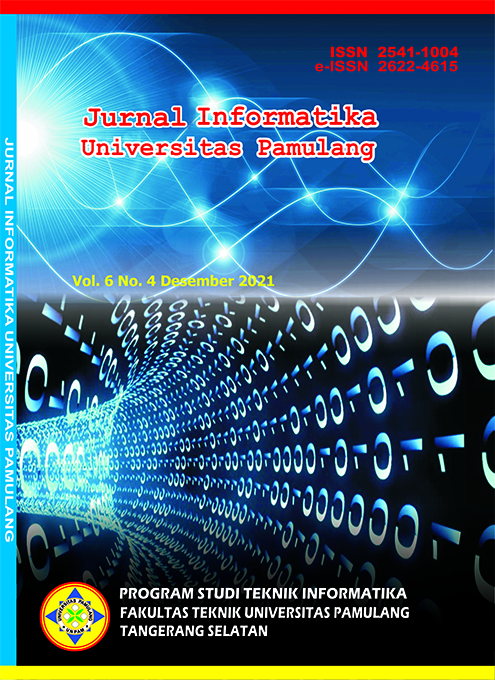Perancangan Aplikasi Chatbot Menggunakan Wit.Ai pada Sistem SPP-IRT Berbasis Web
DOI:
https://doi.org/10.32493/informatika.v6i4.13327Keywords:
Artificial Intelligence, Chatbot, Natural Language Proccesing, Wit.aiAbstract
SPP-IRT is a system of BPOM agencies that implements consulting services for users who are applied using live chat. Judging from the SPP-IRT live chat administrator, there were 254 unserved messages out of 665 messages, and included out-of-hours incoming messages. Judging from the data, SPP-IRT live chat has quite dense traffic. Therefore, it is necessary to create a chatbot that is able to answer questions automatically. Chatbots are designed to be able to communicate with humans using Natural Language Processing (NLP). This chatbot is built with Node.Js and leverages Wi.ai for a knowledge base. Wit.ai is a machine built with NLP. The steps taken in this research start from data collection, analysis, knowledge base design, system design, program creation, testing and system application. This research data was obtained from SPP-IRT related FAQs. The results obtained that chatbots are able to provide diverse responses in accordance with data that has been trained and validated through Wit.ai.
References
AS, R., & Muhamad, S. (2016). Rekayasa Perangkat Lunak (Terstruktur dan Berorientasi Objek) (4 ed.). Informatika Bandung.
Astuti, R. N., & Fatchan, M. (2019). Perancangan Aplikasi Teknologi Chatbot untuk Industri Komersial 4.0. Prosiding Seminar Nasional Teknologi dan Sains (SNasTekS), 1(September), 339–348.
Bratadinata, A. (2013). Mengenal Javascript. masputih.com.
Chandra, A. Y., Kurniawan, D., & Musa, R. (2020). Perancangan Chatbot Menggunakan Dialogflow Natural Language Processing (Studi Kasus: Sistem Pemesanan pada Coffee Shop). Jurnal Media Informatika Budidarma, 4(1), 208.
Khan, R., & Das, A. (2018). Build Better Chatbots. https://link.springer.com/book/10.1007%2F978-1-4842-3111-1
Kisworo, M. W., & Sofana, I. (2017). Menulis Karya Ilmiah. Informatika Bandung.
Pelaporan Live Chat pada SPP-IRT di Tawk.to. (n.d.).
Saraswati, D. N. C. M., & Laksana, I. G. N. D. (2018). Pengawasan Bpom Terhadap Produk Makanan yang Tidak Sesuai Dengan Standar Izin Edar di Kota Denpasar. 2–15.
Shetty, S. (2018). Facebook’s Wit.ai: Why we need yet another chatbot development framework? packtpub.
Wijaya, S., & Wicaksana, A. (2019). JACOB voice chatbot application using wit.Ai for providing information in UMN. International Journal of Engineering and Advanced Technology, 8, 105–109.
Yayat, R. (2017). Kualitas Pelayanan Publik Bidang Administrasi Kependudukan Di Kecamatan Gamping. Jurnal Ilmiah Magister Ilmu Administrasi (JIMIA), 2, 56–65.
Downloads
Published
Issue
Section
License
Authors who publish with this journal agree to the following terms:
- Authors retain copyright and grant the journal right of first publication with the work simultaneously licensed under a Creative Commons Attribution-NonCommercial 4.0 International (CC BY-NC 4.0) that allows others to share the work with an acknowledgement of the work's authorship and initial publication in this journal.
- Authors are able to enter into separate, additional contractual arrangements for the non-exclusive distribution of the journal's published version of the work (e.g., post it to an institutional repository or publish it in a book), with an acknowledgement of its initial publication in this journal.
- Authors are permitted and encouraged to post their work online (e.g., in institutional repositories or on their website) prior to and during the submission process, as it can lead to productive exchanges, as well as earlier and greater citation of published work (See The Effect of Open Access).
Jurnal Informatika Universitas Pamulang have CC-BY-NC or an equivalent license as the optimal license for the publication, distribution, use, and reuse of scholarly work.
In developing strategy and setting priorities, Jurnal Informatika Universitas Pamulang recognize that free access is better than priced access, libre access is better than free access, and libre under CC-BY-NC or the equivalent is better than libre under more restrictive open licenses. We should achieve what we can when we can. We should not delay achieving free in order to achieve libre, and we should not stop with free when we can achieve libre.
Jurnal Informatika Universitas Pamulang is licensed under a Creative Commons Attribution-NonCommercial 4.0 International (CC BY-NC 4.0)
YOU ARE FREE TO:
- Share : copy and redistribute the material in any medium or format
- Adapt : remix, transform, and build upon the material for any purpose, even commercially.
- The licensor cannot revoke these freedoms as long as you follow the license terms





